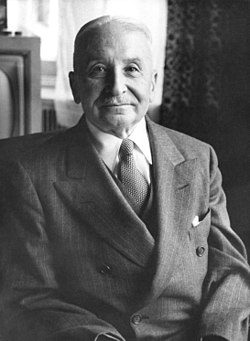
Back Ludwig von Mises Afrikaans لودفيج فون ميزس Arabic لودفيج فون ميزس ARZ Lüdviq fon Mizes Azerbaijani لودویق فن میزس AZB Людвіг фон Мізес Byelorussian Лудвиг фон Мизес Bulgarian লুডভিগ ভন মিসেস Bengali/Bangla Ludwig von Mises BS Ludwig von Mises Catalan
Ludwig von Mises | |
|---|---|
 | |
| Born | Ludwig Heinrich Edler von Mises September 29, 1881 |
| Died | October 10, 1973 (aged 92) New York City, US |
| Resting place | Ferncliff Cemetery, Hartsdale, New York, US |
| Spouse | Margit von Mises |
| Relatives |
|
| Academic background | |
| Alma mater | University of Vienna |
| Doctoral advisor | Eugen von Böhm-Bawerk |
| Influences | |
| Academic work | |
| School or tradition | Austrian School |
| Institutions |
|
| Doctoral students | |
| Notable students | |
| Main interests | Political economy Philosophy of science Libertarianism |
| Notable ideas | |
| Signature | |
 | |
| This article is part of a series on |
| Libertarianism in the United States |
|---|
 |
Ludwig Heinrich Edler von Mises[n 1] (/vɒn ˈmiːzɪz/; German: [ˈluːtvɪç fɔn ˈmiːzəs]; September 29, 1881 – October 10, 1973) was an Austrian-American political economist and philosopher of the Austrian school. Mises wrote and lectured extensively on the social contributions of classical liberalism and the central role of consumers in a market economy.[1] He is best known for his work in praxeology, particularly for studies comparing communism and capitalism, as well as for being a defender of classical liberalism[2] in the face of rising illiberalism and authoritarianism throughout much of Europe during the 20th century.
In 1940, Mises emigrated from Austria to the United States to escape the Nazis. On the day German forces entered Vienna, they raided his apartment, confiscating his papers and library, which were believed lost or destroyed until rediscovered decades later in Soviet archives.[3][4] At the time, Mises was living in Geneva, Switzerland. However, with the imminent Nazi occupation of France threatening to isolate Switzerland within Axis-controlled territory, he and his wife fled through France—avoiding German patrols—and reached the United States via Spain and Portugal.[3]
Since the mid-20th century, both libertarian and classical liberal movements, as well as the field of economics as a whole have been strongly influenced by Mises's writings.[5] Mises's student Friedrich Hayek viewed Mises as one of the major figures in the revival of classical liberalism in the post-war era. Hayek's work The Transmission of the Ideals of Freedom (1951) pays high tribute to the influence of Mises in the 20th-century libertarian movement.[6] Economist Tyler Cowen lists his writings as "the most important works of the 20th century" and as "among the most important economics articles, ever".[7] Entire schools of thought trace their origins to Mises's early work, including the development of anarcho-capitalist philosophy through Murray Rothbard[8] and the contemporary Austrian economics program led by scholars such as Peter Boettke at George Mason University.[9]
Mises’s most influential work, Human Action: A Treatise on Economics (1949), laid out his comprehensive theory of praxeology—a deductive, a priori method for understanding human decision-making and economic behavior.[10] Rejecting empirical and mathematical modeling, Mises defended classical liberalism and market coordination as products of rational individual action. Beyond his published works, Mises shaped generations of economists through his longstanding private seminar in Vienna[11] and later as a professor at New York University. His ideas deeply influenced students such as Friedrich Hayek, Murray Rothbard, and Israel Kirzner, who helped inspire the rise of postwar libertarian institutions in the United States, including the Foundation for Economic Education and the Ludwig von Mises Institute.
Mises received many honors throughout the course of his lifetime—honorary doctorates from Grove City College (1957), New York University (1963), and the University of Freiburg (1964) in Germany. His accomplishments were recognized in 1956 by his alma mater, the University of Vienna, when his doctorate was memorialized on its 50th anniversary and "renewed", a European tradition, and in 1962 by the Austrian government. He was also cited in 1969 as "Distinguished Fellow" by the American Economic Association.[12]
Cite error: There are <ref group=n> tags on this page, but the references will not show without a {{reflist|group=n}} template (see the help page).
- ^ "Ludwig von Mises". Encyclopædia Britannica. June 7, 2023. Retrieved June 29, 2023.
- ^ Hayek, Friedrich A. "Introduction". In Socialism: An Economic and Sociological Analysis, by Ludwig von Mises. London: Jonathan Cape, 1936.
- ^ a b Cite error: The named reference
My Yearswas invoked but never defined (see the help page). - ^ Richard M. Ebeling (ed.), The Lost Papers of Ludwig von Mises, Liberty Fund, 2000. See also: Richard M. Ebeling, “The Rediscovered Writings of Ludwig von Mises,” The Freeman, vol. 47, no. 2, February 1997. Available via the Mises Institute: https://mises.org/library/rediscovered-writings-ludwig-von-mises
- ^ Cowen, Tyler. "Review of Human Action". Journal of Economic Literature 38, no. 4 (2000): 1127-1132.
- ^ Hayek, Friedrich A. (2012). "The Transmission of the Ideals of Economic Freedom". Econ Journal Watch. 9 (2): 163–169.
- ^ Cite error: The named reference
:3was invoked but never defined (see the help page). - ^ Rothbard, Murray N. Man, Economy, and State with Power and Market. Ludwig von Mises Institute, 2004. See Rothbard’s preface crediting Mises’s foundational role.
- ^ Boettke, Peter J. “Austrian School of Economics.” In The Elgar Companion to Austrian Economics, edited by Peter Boettke, Edward Elgar, 1994. Also see: Boettke, “Ludwig von Mises and the Austrian School of Economics,” Journal of Economic Perspectives, 1998.
- ^ Cite error: The named reference
:11was invoked but never defined (see the help page). - ^ Beller, Steven (1989). Vienna and the Jews, 1867–1938: A Cultural History. Cambridge University Press.
- ^ Greaves, Bettina Bien. "Preface to the Third Edition". In Liberalism: In the Classical Tradition, by Ludwig von Mises, 3rd ed., Liberty Fund, 1985.
© MMXXIII Rich X Search. We shall prevail. All rights reserved. Rich X Search